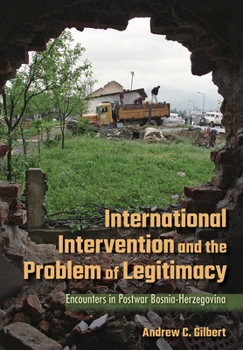International Intervention and the Problem of Legitimacy: Encounters in Postwar Bosnia-Herzegovina
In International Intervention and the Problem of Legitimacy Andrew C. Gilbert argues for an ethnographic analysis of international intervention as a series of encounters, focusing on the relations of difference and inequality, and the question of legitimacy that permeate such encounters. He discusses the transformations that happen in everyday engagements between intervention agents and their target populations, and also identifies key instabilities that emerge out of such engagements. Gilbert highlights the struggles, entanglements and inter-dependencies between and among foreign agents, and the people of Bosnia-Herzegovina that channel and shape intervention and how it unfolds.
Drawing upon nearly two years of fieldwork studying in postwar Bosnia and Herzegovina, Gilbert's probing analysis identifies previously overlooked sites, processes, and effects of international intervention, and suggests new comparative opportunities for the study of transnational action that seeks to save and secure human lives and improve the human condition.
Above all, International Intervention and the Problem of Legitimacy foregrounds and analyzes the open-ended, innovative, and unpredictable nature of international intervention that is usually omitted from the ordered representations of the technocratic vision and the confident assertions of many critiques.
Related Subjects
History Political Science Politics & Social Sciences Social Science Social Sciences




